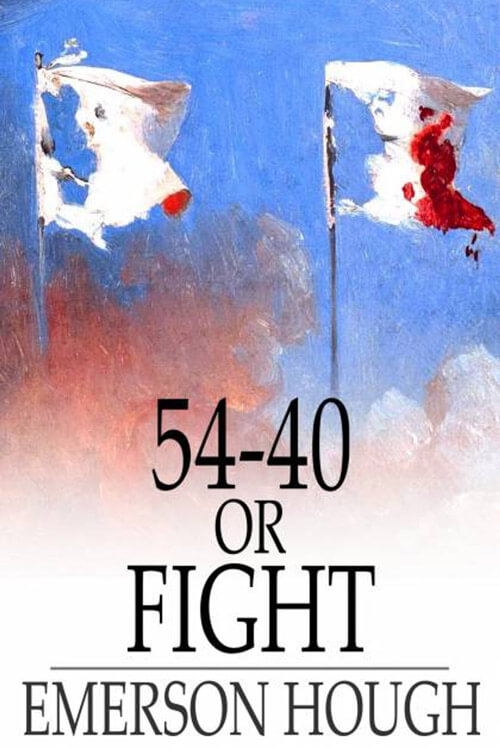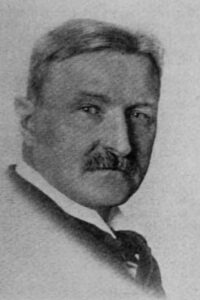
54-40 or Fight
“Then you offer me no hope, Doctor?” The grey mane of Doctor Samuel Ward waved like a fighting crest as he made an answer:
“Not the sort of hope you ask.” A moment later he added: “John, I am ashamed of you.”
The cynical smile of the man I called my chief remained upon his lips, and the same drawn look of suffering remained upon his gaunt features; but in his blue eye, I saw a glint that proved that the answer of his old friend had struck out some unused spark of vitality from the deep, cold flint of his heart.
“I never knew you for a coward, Calhoun,” went on Doctor Ward, “nor any of your family I give you now the benefit of my acquaintance with this generation of the Calhouns. I ask something more of you than faint-heartedness.”
The keen eyes turned upon him again with the old flame of flint which a generation had known—a generation, for the most part, of enemies. On my chief’s face, I saw appear again the fighting flush, proof of his hard-fibered nature, ever ready to rejoin with a challenge when the challenge came.
“Did not Saul fall upon his sword?” asked John Calhoun. “Have not devoted leaders from the start of the world till now sometimes rid the scene of the responsible figures in lost fights, the men on whom blame rested for failures?”
“Cowards!” rejoined Doctor Ward. “Cowards, every one of them! Were there not other swords upon which they might have fallen—those of their enemies?”
“It is not my hand—my sword, Sam,” said Calhoun. “Not that. You know as well as I that I am already marked and doomed, even as I sit at my table tonight. A walk of a wet night here in Washington—a turn along the Heights out there when the winter wind is keen—yes, Sam, I see my grave before me, close enough; but how can I rest easy in that grave? Man, we have not yet dreamed how great a country this may be. We must have Texas. We must have also Oregon. We must have—”
“Free?” The old doctor shrugged his shoulders and smiled at the arch pro-slavery exponent.
Read or download Book
Emerson Hough
Emerson Hough (June 28, 1857 – April 30, 1923) was an American writer best known for writing Western stories and historical novels. His early works included Singing Mouse Stories and Story of the Cowboy. He was well known for his 1902 historical novel The Mississippi Bubble. Many of his works have been adapted into films and serial films.
Career
Hough was born in Newton, Iowa on June 28, 1857. He was in Newton High School’s first graduating class of three in 1875. He graduated from the University of Iowa with a bachelor’s degree in philosophy in 1880 and later studied law and was admitted to the bar in 1882. His first article, “Far From The Madding Crowd,” was published in Forest and Stream in 1882.
He moved to White Oaks, New Mexico, practiced law there, and wrote for the White Oaks newspaper Golden Era for a year and a half, returning to Iowa when his mother was ill. He later wrote Story of the Outlaw, A Study of the Western Desperado, which included profiles of Billy the Kid and Pat Garrett. Hough moved to New Mexico after Garrett shot Billy the Kid, and he became a friend of Garrett. He wrote for various newspapers in Des Moines, Iowa, Sandusky, Ohio, Chicago, Illinois, St. Louis, Missouri, and Wichita, Kansas. In 1889 he got a position as western editor of Forest and Stream, editing the “Chicago and the West” column. He was hired by George Bird Grinnell, the owner of Field and Stream, who founded the Audubon Society in 1886 which, along with Theodore Roosevelt’s Boone and Crockett Club, was a leader in the conservation movement.
Hough was also a conservationist. One of his projects for Forest and Stream was to survey Yellowstone National Park in midwinter 1893, with a guide and 2 soldiers from the nearby fort of the same name. There were supposed to be more than 500 buffalo there, but their count barely reached 100. Due to Hough’s report, eastern newspapers took up the cause against poaching, and in May 1894 the U.S. Congress passed a law making poaching of game in national parks a punishable offense. Later, he and other Saturday Evening Post writers wrote a letter for Stephen Mather and George Horace Latimer to sign, advocating the creation of a national park system. The National Park Service was created in 1916. In addition, he was a co-founder of the Izaak Walton League, an organization of outdoorsmen, in 1922. He wrote the “Out-of-Doors” column for the Saturday Evening Post and these columns later appeared in book form.
In 1902, Hough began his association with Bobbs-Merrill Company (then Bowen-Merrill), which published his first best-seller, The Mississippi Bubble. Hough began a trilogy on America when he published 54-40 or Fight in 1909, dedicated to Theodore Roosevelt. He dedicated the second volume, Purchase Price, to U.S. Senator Albert Beveridge of Indiana in 1910 and the third, John Rawn, to Woodrow Wilson in 1912. He nevertheless campaigned for Theodore Roosevelt, candidate of the Bull Moose Party, in the 1912 presidential election.
Reviewers noted the political nature of Hough’s Western fiction. One reviewer wrote that John Rawn was “not a novel at all; it is an arraignment; it is propaganda” for progressive Republicans or the Democrats. It condemned protective tariffs and presented a consistently negative portrait of money-driven characters. The review was positive, praising the novelist’s portrait of his main character, but little else. Hough “makes his point, and hammers it hard. He leaves nothing for the reader to guess…He goes at it all with bludgeon and battle-ax…He has, as a fighter, a strong style. His book is well worth reading. But it is not art.” Hough responded at length and with good humor, citing widely divergent views of the novel. He explained that a story of “blackguards and traitors” should not lead anyone to the conclusion that he believes such characters typify American society, rather that “imitation of blackguards and traitors is not a fit ambition for Americans.”
He took a public position during the election of 1916, adding his name to a letter sent on behalf of the Roosevelt Authors’ League pledging support to Theodore Roosevelt because “the international crisis makes your re-election to the Presidency essential to the ultimate welfare of our country.” It praised “the splendid fight you are making for Americanism” and had harsh words for the administration of Woodrow Wilson.
His other notable works included Story of the Cowboy, “which received a high recommendation from President Theodore Roosevelt,” Way of the West, Singing Mouse Stories, and The Passing of the Frontier. Among his historical novels, The Magnificent Adventure in 1916 was set at the time of the Louisiana Purchase and the Lewis and Clark Expedition and told, said one reviewer, “a good stirring tale.”
In 1889 Hough wrote Madre D’Oro, a four-act spectacular drama about the Spanish conquest of the Aztecs. With L. Frank Baum, author of The Wonderful Wizard of Oz, created two play treatments: The Maid of Athens: A College Phantasy and The King of Gee-Whiz. Neither was ever completed or staged.
He also wrote autobiographical works, such as “Getting a Wrong Start”, published anonymously as a serial in the Saturday Evening Post in 1913. It appeared in book form two years later. He then wrote “Emerson Hough Himself-by Himself” for the Post in 1917.
Hough wrote the official account of the activities of the American Protective League (APL), a voluntary organization that attempted to enforce patriotism and stifle dissent during World War I. Called The Web: A Revelation of Patriotism, it told the history of that controversial organization in glowing terms and called for a program of “selective immigration, deportation of un-Americans, and denaturalization of ‘disloyal’ citizens and anarchists.” It said: “We must purify the source of America’s population and keep it pure.” When the APL organized teams of vigilantes to enforce the military draft, Hough described the places the organization was most needed: “We find that the great states of each coast are practically foreign – New York most of all.” During the war he wrote a pamphlet for a similar organization, the American Defense Society, called The Indefinite American Attitude Toward the War and When Shall It End?






